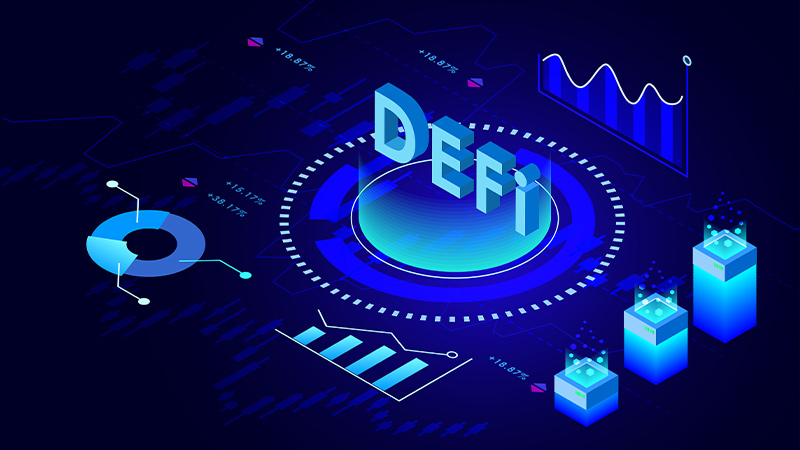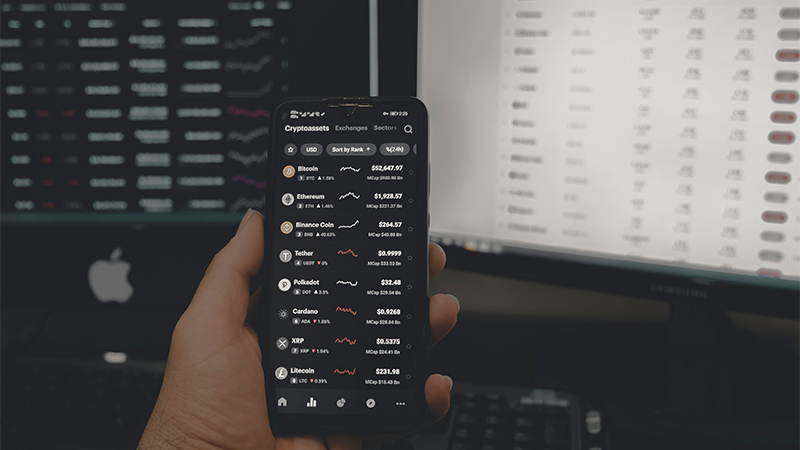The much talked about Polygon MATIC cryptocurrency platform is directed and discussed to provide a thorough guide to this relatively new kid on the block
DeFi, or decentralized finance to give it its full title, is an emerging digital global financial system that gives users visibility and control over their money. Additionally, it is a collective term that includes all financial services and products that use digital currencies.
Decentralized finance eliminates traditional banking systems' controls on finance, financial services, and products. Also, it eliminates the hefty fees that traditional banks charge by holding your money in digital wallets.
Digital banking is open to anyone with an internet connection. Furthermore, your transactions can be made almost instantly.
The first digital currency was Bitcoin, and decentralized finance originates here. For the first time, Bitcoin allowed people to own, control the value of, and send money anywhere in the world.
Trust, or the lack of it, is one of the main issues with many transactions. Bitcoin is held in a digital ledger that rules out the need for trust. Smart contracts are used to eliminate trust issues. These smart contracts only trigger the completion of a transaction when both sides are satisfied.

Ethereum arrived soon after Bitcoin and has also grown at incredible rates. The relationship between Ethereum and decentralized finance has developed into a vast business. The list of services is extensive and includes:
Sending money around the globe is easy and secure. The transactions can be done instantly.
Streaming money over Ethereum enables you to send money by the second, which is extremely useful for rental payments.
Stablecoins are helpful if you need the ensure that fluctuations in currency values won't affect your payments.
Borrowing is easy and can either be peer-to-peer or pool-based. Peer-to-peer means that you borrow from a specific person and pool-based means you borrow from a pool provided by lenders within a group. In addition, decentralized lenders have access to global funds, which makes loans more accessible and controls interest rates.
Tax-efficient borrowing is undoubtedly a plus for everyone. In addition, you can access loans without having to sell your ETH (Ethereum currency).
There are many differences between decentralized finance and traditional banking. Here are a few bullet points:
DeFi deals with cryptocurrency via blockchain technology by using smart contracts.
Cryptocurrencies like Bitcoin, Ethereum, and many others have been with us for a few decades. However, the first fully recognized crypto was Bitcoin which arrived in 2009.
A cryptocurrency is a digital currency that allows transactions to be verified and records maintained by a decentralized system. It gets the name because it uses cryptography rather than a centralized authority. Cryptocurrencies function as a virtual accounting system in addition to a currency.

A blockchain is a mechanism that allows information to be transparently shared by participants within a network. Blockchain technology gets its name because it enables the storage of blocks of data linked in a chain.
The blocks hold an accurate ledger of activity because they cannot be altered or deleted with the consent of all participants in the network. The blockchain creates a permanent ledger that, in turn, tracks payments in and out, orders, and all other transactions. Furthermore, it is secure and can be inspected by all relevant people involved in the transaction.
Smart contracts operate by having an inbuilt set of conditions for the transaction on which they work. If the preset conditions are met, the smart contract fulfills its role, and the transaction is completed.
Decentralized finance works by combining all the elements of crypto, blockchain technology, and smart contracts. Furthermore, by combining these elements, you have an extremely secure and transparent payment system.
The essence of decentralized finance is to provide existing financial services and products using decentralized digital technology. The concept is not to reinvent the wheel but to change how it is built. The goal is to deliver services that people can already access but with a brand new infrastructure.
It is predicted that decentralized finance will provide higher security at a potentially lower cost. The range of services will be greater than with traditional banking. Furthermore, investors can reap greater rewards. Ease of trade from different places in the world will be a significant plus.
Investors in a particular currency can take part in crypto-staking; this is the availability for investors to help support its ecosystem and thus earn a profit. This type of activity is known as yield farming. YieldFarming.com's Malka says, "Anyone can provide crypto assets as liquidity or loans through yield farming that pays the depositor with interest and fees. Yield farming is how you put your crypto to work to earn passive income."
1. Asset management
The technology behind decentralized finance is progressively changing financial market dynamics. Asset management firms are continually looking at ways to transform as challenges within the industry intensify. Blockchains like Ethereum are starting to compete with commercial banks, financial institutions, and fintech companies.
2. Digital Identity
Today, digital technology verifies, tracks, and audits identity information in seconds. Users can now control data and curate their profiles. Genevieve Leveille, CEO, and founder of AgrLedger, states, "Until we have a government accepting those blockchain identities, we still have a risk. We'll have to do KYC (know your client); Web3 will need to have an identity as part of it. And there are so many great brains working on this."
3. Insurance
Unfortunately, scammers and hackers are at an all-time high in the crypto world. It is, sadly, one of the downsides to a decentralized system. However, You can now buy insurance against events and criminal activity in the decentralized finance space. Investors are now turning to DeFi insurance to protect themselves. DeFi Insurance is in the early stages of development and is constantly evolving to perfect its own protocols.
4. Derivatives
Traditionally, a derivative is a contract that derives its value from how an underlying entity performs. These entities may be assets, indexes, commodities, interest rates, or even other derivatives. Derivatives started to emerge in decentralized finance platforms in 2020. Decentralized derivatives do not need brokers to trade. Instead, smart contracts activate settlements in the blockchain when certain preset conditions are met.
5. DAOs
Decentralized Autonomous Organizations are rapidly becoming the primary DeFi governance media in the crypto world. DAOs are already overseeing more than $480 million. The concept of DAO sees artificial intelligence, blockchain, and Web3 working together to create new possibilities. Uniswap is currently the largest and most popular DAO; it acts as a cryptocurrency exchange.
6. Analytics and Data
Analytics is the discovery, interpretation, and communication of recognizable patterns in decentralized finance protocol data. Analysts look at these patterns and apply them to make effective decisions. Developers, researchers, students, and many apps rely upon this data to understand decentralized ecosystems. We can use this data to work smarter, not harder.
7. Compliance and KYT
Compliance fulfillment is fast growing in the decentralized finance world. Ethereum uses its decentralized infrastructure to perform next-generation compliance analysis. KYT or Know Your Transaction is software that analyses organizations to identify fraudulent transactions, including money laundering.
8. Peer-to-peer borrowing and lending
Decentralized finance acts similarly to conventional peer-to-peer lending to facilitate loans of assets between consenting users. In exchange, the Defi platforms receive interest payments. Generally speaking, interest is paid in cryptocurrency. Banks have, of course, have operated in this way for generations. However, with DeFi lending, anyone can become a lender. This system allows anyone to loan out their assets and generate interest.
1. Decentralized Exchanges
Decentralized exchanges, or DEX, are peer-to-peer marketplaces where cryptocurrency traders connect. Traditionally, currency exchanges are centralized, meaning that a central entity controls the marketplace. However, DEXs are non-custodial in that the users remain in control of their currency. This control is achieved by using private keys that act like secure pin numbers.
2. Stablecoins
Decentralized stablecoins are algorithmic and, therefore, not backed by any central entity. Furthermore, they enable investors to earn profits on their crypto assets in a decentralized finance market. As stablecoins are fixed at a predetermined rate, they alleviate any potential adverse effects caused by market volatility. Stablecoins are widely considered to be the holy grail of DeFi technology.
3. Flash loans
Decentralized flash loans are a relatively new form of loans available to traders on some decentralized finance protocols. Based on blockchain technology, they do not require collateral. Therefore, this type of loan does not require intermediaries. In simple terms, a flash loan acts swiftly, hence the name. Funds are borrowed and repaid within seconds and in one swift transaction. Smart contracts set out the loan's terms; if it shows a profit, it is typically charged at 0.09%.
4. Prediction markets
In prediction markets, participants trade on the future outcomes of specific topics. Market prices tend to indicate what the consensus of opinion is within the group. Up to now, remaining a somewhat niche market, prediction markets incentivize experts to tell the world what they predict will happen regarding specific events. Then, people can bet on the outcome.
5. Yield harvesting
Yield harvesting, or yield farming, as it is also called, is a high-risk method of staking or lending cryptocurrencies in exchange for interest or other rewards. When borrowers pay fees to borrow assets, lenders can earn yields by providing them. Profits can be high, but yield farming is seen as one of the more risky elements of DeFi.
To invest in decentralized finance, first, you must prepare a crypto wallet. Choose a currency that suits your needs and a wallet that works with that currency. Then you need to purchase some currency and place it in the wallet. Through your wallet, you can connect to many DeFi protocols via your browser. Common choices are Ethereum for currency and Metamask for a wallet. Most DeFi protocols use Ethereum, so you'll need either ETH or ERC-20 coins.

The easiest way to earn passive income via decentralized finance is to place your crypto onto a platform or protocol that pays you an annual percentage yield. It must, however, be pointed out that DeFi investment is a very high-risk strategy. It is highly possible that DeFi will create new risks and variations on old ones.
Here are 5 risks associated with decentralized finance:
1. Smart Contract Risks
DeFi is open source, and because of this, smart contracts are more open to cybercriminal activity. In addition, smart contracts are prone to various flaws. For example, logic errors, exploiting mispricing, governance risk, and flash loan attacks. As more flaws are exposed, security will, of course, improve. However, at the moment, it is precarious.
2. Oracle Risks
Smart contracts work by utilizing information from outside sources like stock exchanges. Blockchain oracles are third-party services that provide a connection. Disrupted connections can cause contract failure.
3. Scaling Risks
Ethereum is currently able to process 15 transactions per second. By comparison, VISA processes 65,000 per second. Ethereum is currently preparing to move to a faster consensus algorithm method. However, it still has a long way to go. It looks highly likely that costs will decrease in the future, but we are not there yet.
4. Custody Risks
Your security in digital finance is your private key. It really cannot be overstated how vital these keys are. Lose it, and it is a disaster. Put simply, lose your key, and you lose your money, all of it. Your private key is an exceptionally long random number, 256 bits. It cannot be remembered, so you must write it down and keep it safe. Do not save it on your phone. Phones can be hacked.
5. Regulation Risks
Regulators are struggling to come to terms with this new technology. Decentralized finance is a global technology and can be run from anywhere. Getting the regulation right is tricky. If it is too strict, it will kill innovation; however, if it is too soft, it will be far too easy to be exploited.
The total amount of assets locked in decentralized finance protocols grew from $1bn in 2020 to over $200bn by the beginning of 2022. Sadly it is a massive target for fraudsters. The market took big hits in the last couple of years.
However, it looks like better news for current investors. Coin Bureau is predicting a comeback. YouTube pseudonymous Coin Bureau host Guy states, "Starting with Convex Finance, CVX seems to be rallying because of developments on the decentralized stablecoin front."
DeFi platforms offer users new ways to borrow, save, lend or trade. Crypto does not need the traditional bureaucracies found in other financial markets. DeFi coins are seen as a solid option for investment for many people.
It looks certain that decentralized finance is here to stay. As general interest in cryptocurrency grows at a rapid pace, then this new technology is becoming more widely available and, at the same time, more varied. More and more new ideas and protocols are filtering into the crypto market. Its uses seem endless, and we are probably just witnessing the tip of a very large iceberg.
If you enjoyed this article, be sure to follow us on Twitter for weekly updates. We’ve made it our mission to help inspire, educate, and inform readers about the world of cryptocurrency and decentralized technology.
If you like our content feel free to give us some love on social media. You can also send us a message to request a guide or how-to article on any topic related to web3. We look forward to hearing from you!
*Disclaimer: This article is not investment advice. It is published for educational and entertainment purposes only. If you decide to invest in decentralized finance, please practice due diligence and conduct thorough, independent research.
The much talked about Polygon MATIC cryptocurrency platform is directed and discussed to provide a thorough guide to this relatively new kid on the block
The ultimate guide to Bitcoin, its place in the cryptocurrency world, and how you can get involved should you wish. A comprehensive look at Bitcoin.